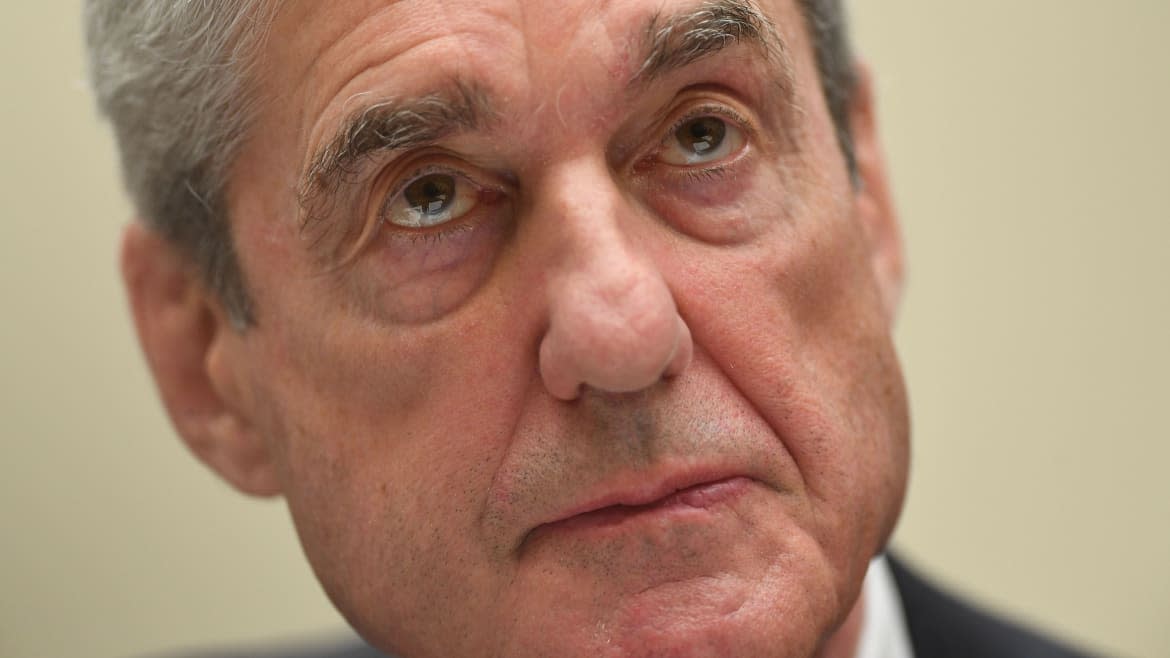Mueller: Trump Gave a ‘Boost’ to WikiLeaks’ ‘Illegal Activity’

Robert Mueller saw Trump’s praise of WikiLeaks as a big red flag.
In his testimony to the House Intelligence Committee on Wednesday, the former special counsel criticized the president’s fondness for the group that published emails stolen from Hillary Clinton’s campaign during the 2016 presidential campaign.
Pressed by Rep. Mike Quigley (D-IL) about Trump’s effusive praise for WikiLeaks on the campaign trail, Mueller was unequivocal.
“‘It’s problematic’ is an understatement, in terms of what it displays in terms of giving some hope or some boost to what is and should be illegal activity,” he said.
The awkwardly phrased comment was Mueller’s most pointed public criticism of the president—strongly insinuating that Trump took the side of criminals during the campaign.
Quigley also asked Mueller if he shared Secretary of State Mike Pompeo’s view that WikiLeaks is a hostile foreign intelligence service.
“Absolutely,” Mueller replied, “and they are currently under indictment.”
Quigley also asked Mueller about communications during the campaign between the president’s eldest son, Donald Trump Jr., and WikiLeaks.
“Disturbing, and also subject to investigation,” he said.
Julian Assange, the founder of WikiLeaks, was in the Ecuadorian embassy in London for the duration of Trump’s campaign.
While he was there, his group published emails that hackers stole from the Democratic National Committee and Hillary Clinton’s campaign chairman, John Podesta, well after it was revealed that Russian intelligence officers were responsible for those hacks.
At the same time, Assange and Trump associates pushed the baseless conspiracy theory that Seth Rich––a murdered DNC staffer––actually leaked the emails to the group as part of a whistleblowing operation. The attempted cover-up was highlighted in Mueller’s report, and the Seth Rich conspiracy has since been folded into the QAnon conspiracy theory, which many Trump supporters also believe.
Assange took refuge in the embassy in London in 2012, when he was facing imminent extradition to Sweden for questioning in a rape and sexual-assault investigation.
Ecuador began tiring of Assange after a change in the country’s leadership, and lost patience entirely when Wikileaks promoted a leak of emails stolen from the account of Ecuador’s new president, Lenín Moreno. On April 11 of this year, the embassy allowed entry to British police who arrested Assange for jumping bail. The U.S. Justice Department immediately unsealed an indictment charging Assange with conspiring with his first prominent source, then-Army intelligence officer Chelsea Manning.
In May, the DOJ unsealed a superseding indictment charging Assange under the Espionage Act for publishing the Manning material. Many First Amendment advocates see the indictment as an unprecedented attack on the rights of publishers. Assange is fighting extradition in the UK courts.
Get our top stories in your inbox every day. Sign up now!
Daily Beast Membership: Beast Inside goes deeper on the stories that matter to you. Learn more.

